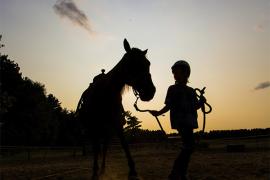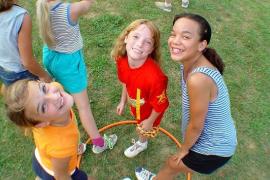Greetings from the ACA Research Team! As you might have heard, ACA has identified research as one of its strategic priorities for the next 5 years. This is exciting news for camp professionals because it promises new data, recognition, and support for the camp experience from individual camps to the camp industry as a whole. Every camp has an important role to play in this strategic direction, and a lot to gain from engaging with research and evaluation at the local camp level. This blog is the first in an ongoing series that focuses on research and evaluation, starting with: Research vs Evaluation. Which one is right for you?
Research and evaluation are two terms that are sometimes used interchangeably to refer to the process of gathering information and using that information for making decisions. This process, sometimes called evidence-based decision making, is a hot topic in educational reform, health care, and youth development, to name a few. The camp industry is no stranger to the concept of evidence and the importance of research and evaluation, but using these terms interchangeably overlooks their potentially unique value to camp professionals.
Google “research vs. evaluation” and you will find numerous answers, including this infographic depicting the key differences in their purpose, methods, and use. Camp research, for example, focuses on broad questions, such those related to the developmental outcomes of the camp experience, as ways to expand our understanding of camp in general. Camp evaluation, on the other hand, tends to focus on the effectiveness of a specific camp or program and is used internally to train staff, assess program improvement over time, or report to funders. Check out some examples of camp evaluation reports here and here.
At the heart of the debate about research vs. evaluation is the assumption that research is time consuming and difficult, but respected and valuable, while evaluation is easier but not as valuable beyond a specific camp. Pitting research against evaluation in this way is not only a limited way of thinking, but it overlooks the ways evaluation, when done well, is far more similar to research than it is different.
So, which one should you focus on at camp? The answer might be BOTH. When we think about research and evaluation as overlapping concepts, we can begin to think about engaging with research and evaluation in a way that is neither time consuming nor complicated.
A great place to start is with ACA’s Briefing Papers, which are short, readable summaries of current research on specific issues related to camp. From there, you might think about connecting with a camp researcher to explore a broad question you have regarding camp programming or youth development in general. Raise the Bar is a group of camp professionals and researchers working together to do just that.
To engage with evaluation, you might check out the American Evaluation Association’s excellent blog or other expert evaluators’ blogs, such as this one, this one, or this one. Or, for evaluation tools specific to camp, take an ACA online course or webinar to learn how to survey campers, conduct a program improvement assessment, or communicate your findings to your stakeholders. Most importantly, think about research and evaluation as two different — although complementary — tools in your camp toolbox.
Next up? What does ACA’s new focus on research as a strategic priority mean for you?
Laurie Browne, Ph.D., recently joined the Research Team at ACA. She specializes in ACA's Youth Outcomes Battery and supporting camps in their research and evaluation efforts. Prior to joining ACA, Laurie was an Assistant Professor in the Department of Recreation, Hospitality, and Parks Management at California State University-Chico. Laurie received her Ph.D. from the University of Utah, where she studied youth development and research methods.
Photo courtesy of Camp Gray, Reedsburg, WI
Thanks to our research partner, Redwoods.
Additional thanks goes to our research supporter, Chaco.
The views and opinions expressed by contributors are their own and do not necessarily reflect the views of the American Camp Association or ACA employees.





